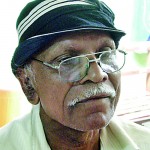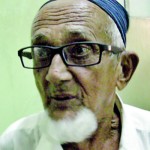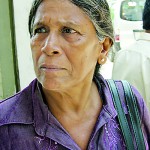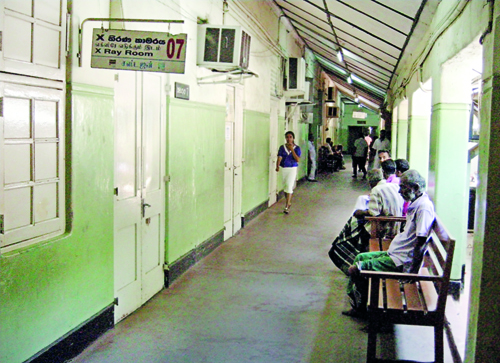News
The bitter pill

V.G Ukkurala
V.G. Ukkurala and his son set off from their home in faraway Badulla, taking the night bus to Colombo to reach the National Hospital in the  capital by 4 a.m. to attend a clinic for his heart ailment. He was in time for the clinic and was prescribed drugs for treatment.
capital by 4 a.m. to attend a clinic for his heart ailment. He was in time for the clinic and was prescribed drugs for treatment.
The two waited for more than an hour for the medicines to be issued, unaware that due to a four-day strike called on Tuesday by health sector employees the issuing of medicines in the hospital had been suspended.
Some patients were referred to one of the outlets of the State Pharmaceuticals Corporation (Osu Sala) scattered around Colombo to collect their medicines while others were told to remain at the National Hospital until a decision had been taken.

Mohamed Thakeen
Mr. Ukkurala and his son were given no idea of how long it would take to be given the drugs they needed.
A father of four mentally ill children, Hettiarachige Jayaratna, said he was exhausted after waiting for four hours at Osu Sala.
“Hospital services are depressing; the hospital said that Osu Sala would give medicine free of charge yet only OPD patients are given free medicine. Clinic patients are neglected – we have to pay and buy them,” Mr Jayaratna said.
The 72-year-old said that he was worried about leaving his wife to cope alone with their four children but he could not leave without obtaining the medicines he needed.

Indrani
Mr. Ukkurala and Mr Jayaratna were among tens of thousands left stranded and helpless over the strike called by 5,000 radiographers, lab technicians, ECG and EEG recordists, X-ray technicians and pharmacists over outstanding promotions and other issues.
Some patients were forced to obtain treatment from private hospitals or to purchase drugs from private pharmacies at their own expense.
On Friday, as trade unionists were threatening to expand their strike, a court order was issued to halt industrial action until September 12.
One patient, Gamini Sarath, said when he had been sent to Osu Sala to get his medicines, Osu Sala staff had sent him back to the hospital, telling they only issued medicines if the prescription carried the stamp of the OPD, not the usual stamp of his doctor.

Patients sit in front of the closed X ray room at the National Hospital, Colombo. Pix by Athula Devapriya and Indika Handuwala
“The doctor’s stamp is not enough, the hospital says; I need another stamp or else I will not get any medicine,” he said.
Another patient, Indrani from Rajagiriya, who had also gone to hospital and been despatched to an Osu Sala outlet could only afford to buy part of what she needed.
“The end result of the strike is that I wasn’t able to get enough medicine for the month because I wasted a lot of my money on travelling (between the hospital and Osu Sala),” she said.
W.M.S. Weerasundara, who has a heart condition said that after a doctor gave his prescription he had been sent from one place to another in the hospital to get the required stamp.
He had queued for more than an hour at Osu Sala but had given up trying to get his drugs from there because he had been number 169 in the line and would have had to wait a long time more to get served.
“I’m getting my medicine from a private pharmacy. I have to spend money but if I stay here I would get more sick, and even now I am tired,’’ Mr Weerasundara said.
One patient who got his drugs at the Osu Sala, E.I. Premalal, supported the strikers. “This is the Health Ministry’s responsibility,” he said. “It hasn’t met the demands of the trade unions for years and the strike is fair.”
Mohamed Thakeen, who had waited hours to get his drugs, said that even patients who had been able to get free medicine had been financially affected because they had to pay for three-wheeler transport between the hospital and an Osu Sala outlet.
The Joint Council of Professions Supplementary to Medicine (JCPSM) which had called the strike on Tuesday expanded the strike on Wednesday by quitting from emergency services in some hospitals and completely quitting emergency services on the following day.
They said cancer hospitals and children’s hospitals would not be affected but warned that if their demands were not met those hospitals would also experience strikes.
JCPSM secretary Saman Jayasekara said the union’s main demand was promotions in grades and that that had seen no movement in grades for eight-and-a-half years.
He said a third of JCPSM employees needed to be promoted.
Mr. Jayasekara also said the diplomas for the supplementary professions should be converted into degrees.
The General Secretary of the Society of Government Pharmacists, A.P. Tilakaratne, said the Health Ministry did not function efficiently due to a cold war between two factions of officials.
He said even taking basic steps to solve industrial concerns of health sector employees were blocked by dissension between higher authorities.
He said Colombo Osu Sala has only about 60 pharmacists, too few to service a load of hospital patients.
The Deputy Minister of Health Lalith Dissanayake said he and Health Minster “are kindly requesting (strikers) to report to work because the patients are suffering”.
He said the union’s demands would be considered; all the demands could not be met but fair demands would be accepted.

